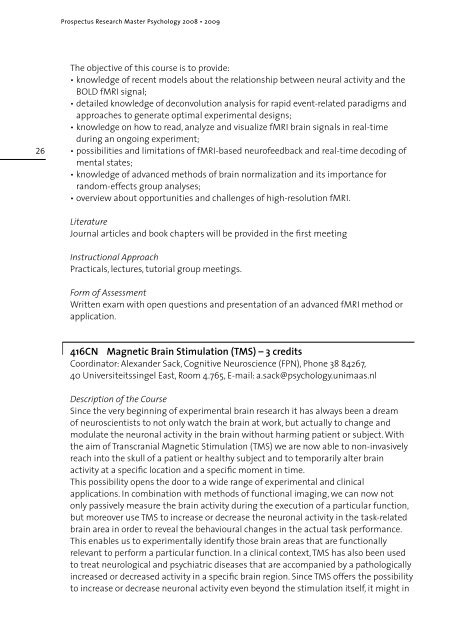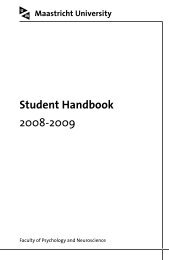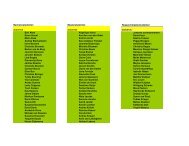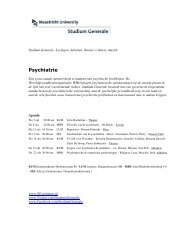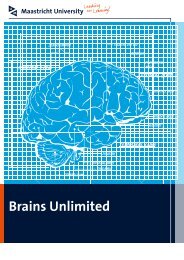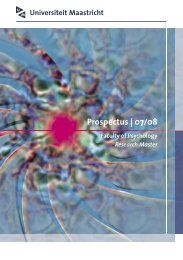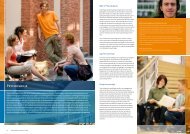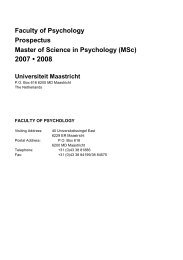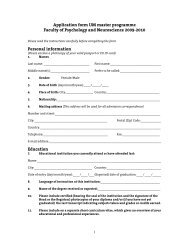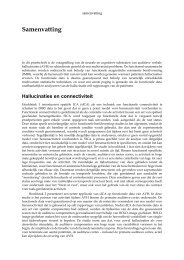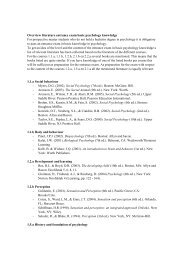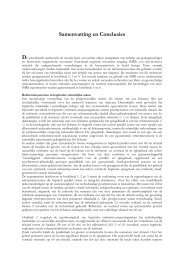Prospectus | 08/09 - Psychology and Neuroscience - Maastricht ...
Prospectus | 08/09 - Psychology and Neuroscience - Maastricht ...
Prospectus | 08/09 - Psychology and Neuroscience - Maastricht ...
Create successful ePaper yourself
Turn your PDF publications into a flip-book with our unique Google optimized e-Paper software.
<strong>Prospectus</strong> Research Master <strong>Psychology</strong> 20<strong>08</strong> • 20<strong>09</strong><br />
26<br />
The objective of this course is to provide:<br />
• knowledge of recent models about the relationship between neural activity <strong>and</strong> the<br />
BOLD fMRI signal;<br />
• detailed knowledge of deconvolution analysis for rapid event-related paradigms <strong>and</strong><br />
approaches to generate optimal experimental designs;<br />
• knowledge on how to read, analyze <strong>and</strong> visualize fMRI brain signals in real-time<br />
during an ongoing experiment;<br />
• possibilities <strong>and</strong> limitations of fMRI-based neurofeedback <strong>and</strong> real-time decoding of<br />
mental states;<br />
• knowledge of advanced methods of brain normalization <strong>and</strong> its importance for<br />
r<strong>and</strong>om-effects group analyses;<br />
• overview about opportunities <strong>and</strong> challenges of high-resolution fMRI.<br />
Literature<br />
Journal articles <strong>and</strong> book chapters will be provided in the first meeting<br />
Instructional Approach<br />
Practicals, lectures, tutorial group meetings.<br />
Form of Assessment<br />
Written exam with open questions <strong>and</strong> presentation of an advanced fMRI method or<br />
application.<br />
| 416CN Magnetic Brain Stimulation (TMS) – 3 credits<br />
Coordinator: Alex<strong>and</strong>er Sack, Cognitive <strong>Neuroscience</strong> (FPN), Phone 38 84267,<br />
40 Universiteitssingel East, Room 4.765, E-mail: a.sack@psychology.unimaas.nl<br />
Description of the Course<br />
Since the very beginning of experimental brain research it has always been a dream<br />
of neuroscientists to not only watch the brain at work, but actually to change <strong>and</strong><br />
modulate the neuronal activity in the brain without harming patient or subject. With<br />
the aim of Transcranial Magnetic Stimulation (TMS) we are now able to non-invasively<br />
reach into the skull of a patient or healthy subject <strong>and</strong> to temporarily alter brain<br />
activity at a specific location <strong>and</strong> a specific moment in time.<br />
This possibility opens the door to a wide range of experimental <strong>and</strong> clinical<br />
applications. In combination with methods of functional imaging, we can now not<br />
only passively measure the brain activity during the execution of a particular function,<br />
but moreover use TMS to increase or decrease the neuronal activity in the task-related<br />
brain area in order to reveal the behavioural changes in the actual task performance.<br />
This enables us to experimentally identify those brain areas that are functionally<br />
relevant to perform a particular function. In a clinical context, TMS has also been used<br />
to treat neurological <strong>and</strong> psychiatric diseases that are accompanied by a pathologically<br />
increased or decreased activity in a specific brain region. Since TMS offers the possibility<br />
to increase or decrease neuronal activity even beyond the stimulation itself, it might in


